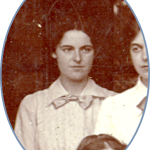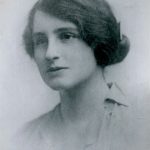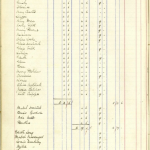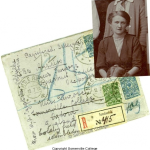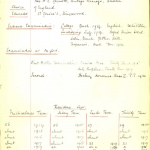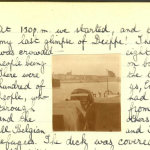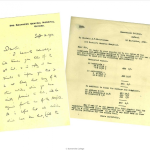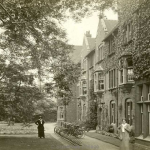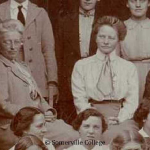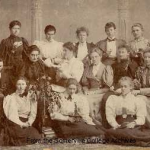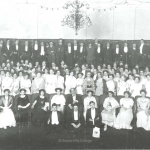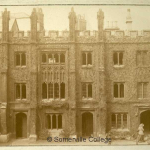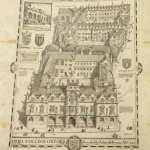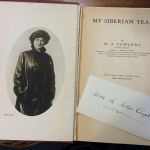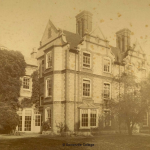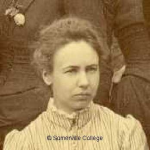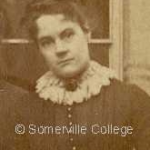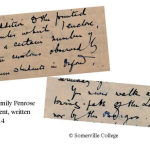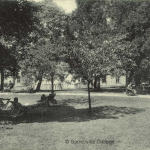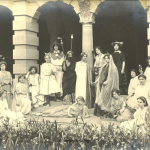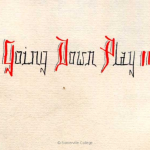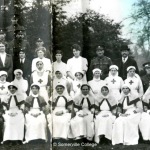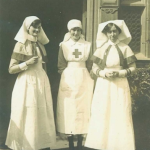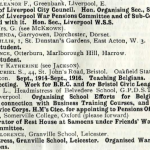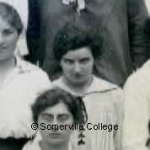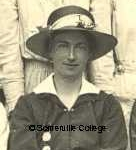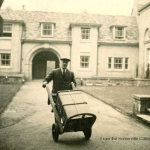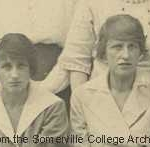Somerville and the Great War
2014 is the centenary of the Great War and Somerville College Archives will be commemorating the events of 1914 – 1918 through this blog. Regularly updated to reflect the real-time impact of the war on the College, including Somerville’s role as a military hospital, the College’s evacuation to Oriel and the wide variety of war work undertaken by alumni, students and staff, the archives reveal rarely explored aspects of life on the home front.
February 1914 : Somerville College Before the Outbreak of War
“I didn’t begin to write my speech for the O.S.D.S.* debate until Thursday morning, and I timed it to take exactly two minutes. I was the Proposer and the motion was, ‘That the reluctance of the modern woman to marry is a benefit to Society.’ I wore …
Read MoreMarch 1914: Vera Brittain is Awarded an Exhibition
“I realised that I could not have any chance at all” Vera Brittain, ‘March 16th-20th, Somerville College, Oxford’ Chronicle of Youth In March 1914, Vera Brittain visited Somerville to take the College entrance examination. She had applied not just f…
Read MoreApril 1914: Scroggs Retires
‘He had served the College for twelve and a half years with fidelity and real affection; and it was a pleasure to both Staff and Students to be able to express their appreciation of his faithful service and that of his wife in the form of presents to…
Read MoreMay 1914: The Launch of Miss Czaplicka’s Siberian Expedition
On 9th May 1914, the Polish anthropologist and Somerville student Marya Czaplicka applied for funds for an expedition to Siberia. Marya Czaplicka had arrived in England in 1911 to take the diploma course in anthropology at Somerville. Intelligen…
Read MoreJune 1914: The Commemoration Dance
‘The hall proved ideal for dancing: the floor was all that could be desired.’ Somerville College Log Book, June 1914 Commemoration Week, the week after the end of Trinity Term, is a traditional time for balls in Oxford, and in 1914 Somervill…
Read MoreJuly 1914: The Uncertainties of the Long Vacation
‘Exactly a fortnight before the world as I had known it crashed into chaos, I went to Leek to take my Oxford Senior.’ Vera Brittain, Testament of Youth. The long vacation in 1914 should have been a time of rest, recuperation and prepa…
Read MoreAugust 1914: “To Germany in 1914”
In 1919, a student called Margaret Bunbury Foote came up to Somerville to read English. Her father was a clergyman and her mother a suffragette and member of the Women’s Social & Political Union. Amongst the papers Margaret Foote was later to lea…
Read MoreSeptember 1914: the Contribution of Non-Combatants
“It is impossible even in writing a college letter to pass over in silence the subject which is filling everyone’s mind. In Oxford we are reminded at every turn of the greater happenings…” Oxford Letter, Somerville Students Association Annual Report …
Read MoreOctober 1914: Vera Brittain Arrives for the New Academic Year at Oxford
In October 1914, thirty six new students arrived to begin their university careers at Somerville. Amongst these ‘freshers’ were Vera Brittain, the future author and playwright Muriel St Clare Byrne and another English exhibitioner, Una Ellis-Fermor, …
Read MoreNovember 1914: ‘At Home’ to the Belgians
Between 1914 and 1915, over two hundred thousand Belgians were to flee to Britain and Oxford became one of many centres to offer accommodation and assistance to some of those refugees. As well as the widely held public sympathy for Belgium’s plight, …
Read MoreDecember 1914: ”Go Home and Keep Quiet”; Early War Work for Women
As Michaelmas Term ended in December 1914, Somerville ‘sustained an irreparable loss’ with the departure of Miss Lucy Kempson, the College librarian and Principal’s secretary. Leaving to join the war effort, she initially nursed with the Re…
Read MoreJanuary 1915: Dr. Maude and the RAMC
1915 was to be a year of momentous change for Somerville College. Unlike the men’s colleges, life in Somerville had been largely unaffected during the first five months of the war, but by Hilary Term of 1915, the War Office was starting to cast covet…
Read MoreFebruary 1915: Parliament and the Tub Thumpers; political debates in college
Debating, and particularly the discussion of political issues, had long been popular in Somerville. A women’s debating society was founded in 1882 and became the United Halls Debating Society (later the Oxford Students’ Debating Society, see February…
Read MoreMarch 1915: The 3rd Southern General Hospital, Somerville Section
‘.. if the War Office would welcome the use of Somerville for wounded, and if we can find some suitable place in which we could accommodate the college for a time, we ought to be patriotic.’ Miss Penrose to Mr Gillett, 20th Febr…
Read MoreApril 1915: from Somerville to Skimmery
“It is impossible to allude even casually to the migration, without mentioning the almost miraculous speed and efficiency with which the move was effected, thanks to the untiring labours of Miss Penrose and Miss Walton and the splendid co-operation o…
Read MoreMay 1915: From College to Hospital
The 3rd Southern General Hospital opened at the beginning of the war in the University Examination Schools. It was one of twenty three Territorial Force general hospitals, housed in converted civilian buildings in key locations, selected for thi…
Read MoreJune 1915: Winds of change
“Somerville and Somervillians (though the number of resident students shows no diminution) have been greatly affected by the War, and may, it seems likely, be even more affected in the future.” Somerville Report 1915 In June 1915, the first acad…
Read MoreJuly 1915: Forage, Farming & Food: Women in Agriculture
Amongst the six students to leave Somerville for war work in June 1915 was Helen Norah Hughes. She had entered the College in October 1914 to read English and was a friend of Vera Brittain’s, but rather than nurse, she became a Checker of Forage for …
Read MoreAugust 1915: The Amazons of the SCR
“The summer vacation has been a busy time for many of us. Miss Penrose, with the co-operation of Miss Darbishire and Miss Walton, undertook to organise the National Registration in Oxford” SSA Annual Report, November 1915. Miss Emily Penrose, Somervi…
Read MoreSeptember 1915: By Steamer and Sledge: the return of Miss Czaplicka’s Expedition
In September 1915, almost 16 months after her departure, Marya Czaplicka returned to Oxford (see May 1914 blog). The long and arduous trip, complicated by the outbreak of war, was an overwhelming success. The expedition, under the auspices of the Oxf…
Read MoreOctober 1915: Somerville’s Scattered Community
“The darkened streets have added to the difficulties of our scattered community life and have made journeys to and from the lodgings – even with the aid of a torchlight – a service of danger.” SSA Annual Report 1916, Oxford Letter In Micha…
Read MoreNovember 1915: The ‘Munitionettes’: Women in the Munitions Industry
In November 1915, Ethel Kerr began her training at Armstrong-Whitworth’s in Newcastle to become a munitions worker or ‘munitionette’. She was one of a number of Somervillians, and hundreds of thousands of women, employed in munitions factories as a r…
Read MoreDecember 1915: The ‘Chap. Rules’ Petition
Members of Somerville, concerned that the migration to Oriel would undermine the coherence and traditions of the college (see blog Oct 1915), had their fears realised when some of the students abandoned procedure (and potentially propriety)…
Read MoreJanuary 1916: “No ‘Flaire’ for Nursing”; roles for women in the Voluntary Aid Detachments
By January 1916, Vera Brittain had been nursing for six months. After her initial Red Cross training at home in Buxton, she had been posted to the 1st London General Hospital in Camberwell as a Voluntary Aid Detachment nurse (VAD). The death of her f…
Read MoreFebruary 1916: ‘Women Patrols’: moral guardians and prototype police
Among the many varieties of war work undertaken by Somervillians, a small number of former students chose to join the Women Patrols organised by the NUWW (National Union of Women Workers). Janet Gulliver was one; she had come up to Somerville in 1907…
Read MoreMarch 1916: Somervillians Sewing Shirts for Soldiers
During the academic year, students had comparatively few opportunities to do war work as scholarly and college pursuits took up most of their time. The college meetings, held by the JCR, did provide a chance to…
Read MoreApril 1916: The Court-Martial of a Conscientious Objector
“I can’t tell you how glad I am about the fine spirit of the imprisoned COs. I never feared that many of them would give way, but I hadn’t expected that they would actually have an effect like this on the outside world. I thought that was past influe…
Read MoreMay 1916: Somerville’s Parliament Debates Conscription for Women
In May 1916, a second Military Service Act extended conscription to married men. Inspired by this, on 31st May 1916, Somerville’s Parliament considered a bill to conscript women, so that more men could be released to the armed forces and women m…
Read MoreJune 1916: Fees and degrees; advances for women at Oxford
By June 1916, almost two years of wartime had altered the relationship between the women’s colleges and the University more profoundly than the years of pre-war lobbying and gentle persuasion. ‘A Mess of Pottage’, the Going Down Play performed that J…
Read MoreJuly 1916: Emerging Medical Therapies: the Almeric Paget Massage Corps
In July 1916, Helen Waters, a former English student at Somerville, joined the Almeric Paget Massage Corps (APMC), having undergone training in ‘Massage and Medical Electricity’. The APMC was one of the many voluntary schemes, established at the outb…
Read MoreAugust 1916: Siegfried Sassoon at the 3rd Southern General
“At the beginning of August 1916 I found myself deposited at No. 3 General Service Hospital, which was in Somerville College, Oxford. To be lying in a little white-walled room, looking through the open window on to a College lawn, was for the first f…
Read MoreSeptember 1916: Medical Advances and Traditional Remedies
Unique among Somervillians who volunteered to help the war effort was Muriel Reynolds, who had come up to read modern languages in 1901. She spent the early part of the war in Bristol, teaching Belgian refugees and working for the Red Cross but she a…
Read MoreOctober 1916: Settling in for the Duration
“Another year finds us still scattered, and Somerville’s hospital work still as urgently needed. We at present occupy Micklem Hall, Sheldonian House, three houses in King Edward Street, and one in Oriel Street, besides St Mary Hall. Our numbers…
Read MoreNovember 1916: Somerville’s Parliament debates Universal Suffrage
Somerville’s Parliament, in its debates, endeavoured to examine the issues under consideration by the national Parliament, although limited to just two meetings per term and with far fewer members in attendance. The meeting held in November 1916 prod…
Read MoreDecember 1916: Saving for the Nation
By December 1916, the war had been underway for almost two and a half years. The cost to the countries involved was unprecedented, both in terms of the casualties and losses sustained and in terms of the money needed to finance the participants’ mili…
Read MoreJanuary 1917: Bed-making and Tea Parties; the students economise
By January 1917, the war was taking its toll on the home front. Shortages of food, fuel and staff were resulting in higher costs, at a time when money was also in short supply. Morale was low and for Vera Brittain, stationed at this time in Malta, le…
Read MoreFebruary 1917: Conflict and Continuity: war work for University women
Throughout the Great War, the number of Somerville students officially pursuing war work remained comparatively small. However, these were students, such as Vera Brittain, who had taken a leave of absence, most intending to return after a term, a yea…
Read MoreMarch 1917: The Fritillary’s Literary Alumnae
The college meeting in March was held, in part, to elect junior members of Somerville to various offices, such as the O.S.D.S. (Oxford Students Debating Society) Rep., Fiction Librarian and Junior Bicycle Secretary. The Senior Student also asked for …
Read MoreApril 1917: Miss Lorimer takes a Leave of Absence
Hilda Lorimer was Somerville’s Tutor in Classics (and subsequently Tutor in Classical Archaeology). A Scotswoman from Dundee, she became a fellow in 1896, having taken a 1st in Classics at Girton College, Cambridge. In 1914-15, she taught Vera Britta…
Read MoreMay 1917: The view from the home front
The Somerville JCR held two meetings in May 1917. The subjects under discussion included the usual items of college business such as the river rules, the storage of bicycles, noise in the quad and a vote on taking a college photograph. Issues reflect…
Read MoreJune 1917: Bertha Phillpotts, the inadvertent civil servant
Somerville was the first women’s college in Oxford to attract research funding, with an endowment from Rosalind, Countess of Carlisle in 1912. The Icelandic scholar Bertha Phillpotts, of Girton College Cambridge, became the first Lady Carlisle Resear…
Read MoreJuly 1917: Transportation and the long vacation
In July 1917, Somerville College held its first Vacation Term. There were (and are) strict rules governing residence for students at Oxford, rules with which Somervillians complied (even though they had yet to be admitted as members of the University…
Read MoreAugust 1917: “Miss Sorabji’s Work in India”
“Of all the varying forms of war-work on which members of the SSA are engaged perhaps none is more valuable or more interesting than Miss Sorabji’s.” SSA Annual Report 1917 Cornelia Sorabji was a student at Somerville between 1889 and 1892, the …
Read MoreSeptember 1917: Rev. Constance Coltman
In September 1917, Constance Coltman became the first British woman to be ordained in one of the mainstream Protestant churches, when she became a Congregationalist minister. Constance Todd’s father, George, was a headmaster and her mother Emily had …
Read MoreOctober 1917: Winifred Holtby arrives at Somerville
By October 1917, Vera Brittain was nursing at the No.24 General Hospital at Étaples and her future friend and fellow author, Winifred Holtby, was settling in as a new student at Somerville College. Winifred Holtby came up to Oxford to read history at…
Read MoreNovember 1917: Entertaining the Troops
Regular readers of this blog will know how much it owes to the Somerville Students’ Association (SSA) annual reports of the period and, in particular, to the list of members and their war work, which was included in the report published in November 1…
Read MoreDecember 1917: The Oxford Bed
In the Michaelmas term of 1917, Somervillians began fundraising for the New Hospital for Women. By this stage of the war, medical provision for the civilian population was under severe strain, as military requirements took precedent in the deployment…
Read MoreJanuary 1918: Miss Emily Penrose, OBE
On 1st January 1918, the Principal of Somerville College Emily Penrose was appointed an Officer of the Order of the British Empire (OBE). She received it in recognition of her work on the National Register, undertaken in 1915 with, it was reported in…
Read MoreFebruary 1918: Leading the Way
On 6 February 1918, the Representation of the People Act extended the right to vote to all men aged over 21 and, for the first time, to some women. To qualify, the women had to be over 30, own property or be graduates voting in a University constitue…
Read MoreMarch 1918: Votes and Degrees
“… all women who have been admitted to and passed the final examination, and kept the period of residence necessary for a man to obtain a degree at a University, are entitled, provided they have attained the age of 30 years, to be registered as Parli…
Read MoreApril 1918: Conflicting Calls of Duty
In April 1918, Vera Brittain returned from France to London. She had been posted to the No. 24 General Hospital at Étaples in August 1917. It was close to the front and frantically busy and by April 1918 the German spring offensive meant every experi…
Read MoreMay 1918: the Business Girls’ Club
Somerville had many thriving societies before and during the First World War – sporting, debating, artistic and philanthropic, including the WUS (Women’s University Settlement) and a college branch of the WEA (Workers’ Educational Association). From …
Read MoreJune 1918: The Somerville Section Album
“The Principal was authorised to have a few photographs taken of Somerville College as at present used.” Council minutes, 4 June 1918 In June 1918, Somerville commissioned a photographer to record the college in its wartime role as a hospital. T…
Read MoreJuly 1918: The Long View
In July 1918, Winifred Holtby was beginning her national service having enlisted in Queen Mary’s Army Auxiliary Corps. Like Vera Brittain three years earlier, she had found it impossible to continue her studies at Somerville but her enlistment in the…
Read MoreAugust 1918: All quiet on the Oxford
By August 1918, the tide of the war was turning, with the launch of an Allied offensive in Flanders and the last Zeppelin raid on England on August 5th.Meanwhile, rationing and shortages permitting, life carried on in Somerville. The 1918 SSA Annual …
Read MoreSeptember 1918: Lorimer of the F.O.
Hilda Lorimer, Somerville’s Classics Tutor, was renowned as a scholar of Homeric archaeology. She had travelled extensively in Greece before the war and in 1917 she spent six months as an orderly with the Scottish Women’s Hospitals, in the Salonika c…
Read MoreOctober 1918: War and Peace
The Somerville Council met twice in October 1918, an extraordinary meeting on the 8th, primarily to discuss Miss Lorimer’s leave of absence and again on October 22nd to conduct college business and the issues which had arisen over the summer vacation…
Read MoreNovember 1918: “So it has come at last! What a day this has been.”
‘The news of the Armistice reached Oxford soon after 11 am. This was the signal for an outburst of patriotic enthusiasm chiefly manifest in the ringing of the bells of Oxford, the display of the flags of the Allies from every available window (& …
Read MoreDecember 1918: Oxford after the war
In the months following the Armistice, the military presence in Oxford dwindled and civilian and academic life began to return to normal. Principal Emily Penrose’s immediate concern was the timely return of the Somerville site to the college. Once th…
Read More